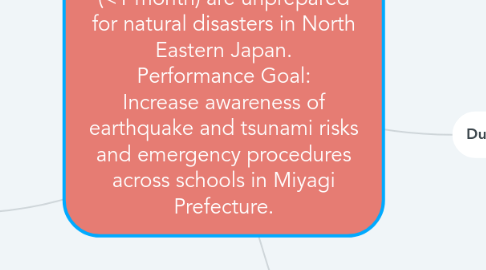New foreign teacher arrivals (<1 month) are unprepared for natural disasters in North Eastern Japan. Performance Goal: Increase awareness of earthquake and tsunami risks and emergency procedures across schools in Miyagi Prefecture.
作者:Carrie Buckley


1. Before an Earthquake/ Tsunami
1.1. Read emergency procedure pack
1.2. Download earthquake notification app on allocated mobile (given by school)
1.3. Take out relative health insurance/ travel insurance if pre teaching
1.4. Make a note of your home country's embassy details in Japan (address and number) and register there so they will know you are in the country/ region.
1.5. Make your emergency kit ( a flashlight, a portable radio, batteries, chargers, a can opener, a first-aid kit, blankets, rainwear and copies of important documents (passports, bank details, the deed to your home [kenrisho], etc.) and cash)
1.6. Know evacuation routes
1.7. 'quake proof' your home and work area (so things don't fall onto you!
2. During an Earthquake/ Tsunami
2.1. Follow planned evacuation route
2.2. Grab your emergency pack
2.3. Remember to take food and water
2.4. Call the emergency services (if relevant/ you are injured/ someone else is injured/ in danger)
2.4.1. 110 for Police
2.4.2. 119 for Fire and Ambulance Services
